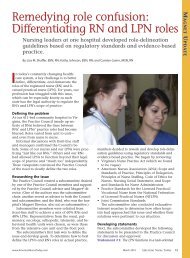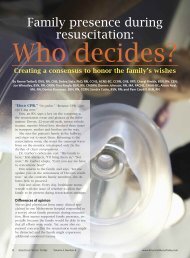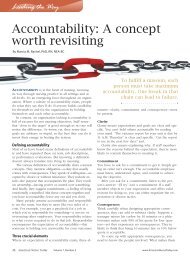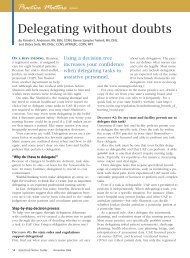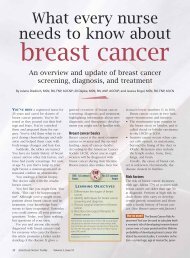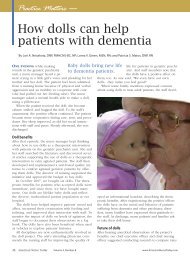2009 MAGNET™ PROFILES - American Nurse Today
2009 MAGNET™ PROFILES - American Nurse Today
2009 MAGNET™ PROFILES - American Nurse Today
You also want an ePaper? Increase the reach of your titles
YUMPU automatically turns print PDFs into web optimized ePapers that Google loves.
MAGNET <strong>PROFILES</strong><br />
(continued from page 50)<br />
eas were represented, including<br />
medicine, surgery, heart hospital,<br />
maternal-child health, psychiatry,<br />
transplant, and rehabilitation.<br />
<strong>Nurse</strong>s from the risk management,<br />
hospital quality, infection control,<br />
and research departments also were<br />
represented. Respondents’ years of<br />
experience as an RN ranged from 1<br />
to 54; 29% had less than 10 years’<br />
experience, 22% had 11 to 20 years,<br />
28% had 21 to 30 years, and 17%<br />
had more than 30 years.<br />
Frequently reported nursingcare<br />
values<br />
The five most frequently reported<br />
nursing-care values were:<br />
• respect and teamwork (each<br />
identified by 30% of respondents)<br />
• caring (identified by 26%)<br />
• integrity (26%)<br />
• compassion (24%).<br />
Less frequently reported values were:<br />
• professional compensation/benefits (13%)<br />
• education; safety (11% each)<br />
• competence; nurse/patient ratio (10% each)<br />
• quality (9%)<br />
• dedication; knowledge (7% each)<br />
• patient satisfaction; excellence (6% each)<br />
• autonomy (5%).<br />
All other values listed were identified by less<br />
than 5% of respondents.<br />
When it came to the value of teamwork, researchers<br />
found a significant difference based on<br />
years of experience: RNs who had less experience<br />
were more likely to identify teamwork as a value<br />
than those with more experience.<br />
Departmental and position differences<br />
Nursing-care values also differed significantly by<br />
department:<br />
• <strong>Nurse</strong>s in medicine, surgery, rehabilitation,<br />
and ambulatory units more often identified respect<br />
as a value.<br />
• <strong>Nurse</strong>s in the heart and medicine units more<br />
often identified caring as a value.<br />
• <strong>Nurse</strong>s in the heart hospital more often identified<br />
integrity as a value.<br />
• <strong>Nurse</strong>s in the psychiatry and transplant units<br />
more commonly identified compassion as a<br />
value.<br />
Researchers also found significant differences<br />
in values based on the respondent’s position.<br />
Those in leadership roles (nurse educators, managers,<br />
and nurse practitioners) were more likely<br />
Understanding the study methods<br />
After the Institutional Review Board approved the philosophy of nursing study,<br />
all hospital registered nurses (RNs) received a 1-page, open-ended questionnaire.<br />
Besides collecting demographic data (such as department, current position,<br />
number of years as an RN, and number of years employed at the hospital), the<br />
survey asked respondents to indicate the three values they considered most important<br />
to nursing care.<br />
Researchers computed descriptive data for background variables. All nursingcare<br />
values identified by respondents were listed and the frequency of their occurrence<br />
was tabulated. The task force then held focus groups with Magnet<br />
champions from each unit to help validate the responses and collapse categories<br />
where responses were similar. For example, the values “patient respect,”“respect<br />
for patients,”“respectful,” and “respect for others” were all collapsed into the “respect”<br />
category. Then the identified values were collapsed into similar categories<br />
based on group consensus.<br />
Data analysis included identifying the most frequently cited categories of values.<br />
T tests were done to determine differences in reports of values based on respondents’<br />
years of experience. Researchers used single-predictor logistic regression<br />
analyses to examine how the top five values varied by position type and<br />
clinical department.<br />
than others to identify competence, research, and<br />
evidence-based practice as core values.<br />
Implications<br />
Developing and revising a philosophy of nursing<br />
care hinges on clinical nursing staff involvement.<br />
For the work to have direct relevance and meaning<br />
in guiding everyday clinical practice, stakeholders<br />
at all levels must be involved.<br />
Outcome<br />
After analysis of the research data, each nurse received<br />
a clip badge listing the top five nursing-care<br />
values to add to her or his nametag. Immediate<br />
plans are to add unit plaques with the top nursing<br />
values and to disseminate information about core<br />
nursing values throughout the hospital system in<br />
grand rounds and research day presentations. In a<br />
qualitative study component subsequently initiated,<br />
nurses from each unit were asked how the topidentified<br />
values guide their nursing care; data will<br />
be available to inform the next phase of the study.<br />
<strong>Nurse</strong> leaders in other hospitals have expressed interest<br />
in replicating the study so they can update their<br />
facilities’ nursing philosophy. Comparative analyses<br />
are likely to be initiated to determine similarities and<br />
differences based on hospital type, patient and nurse<br />
characteristics, and facility mission and goals. Based<br />
on presentation of this project’s core research at an<br />
international nursing conference, cross-cultural<br />
projects are likely to be initiated as well.<br />
■<br />
The authors were members of the Philosophy of Nursing Task Force at the<br />
Department of Nursing, Mt. Sinai Hospital, New York, New York, when this article<br />
was written.<br />
52 <strong>American</strong> <strong>Nurse</strong> <strong>Today</strong> Volume 4, Number 8




